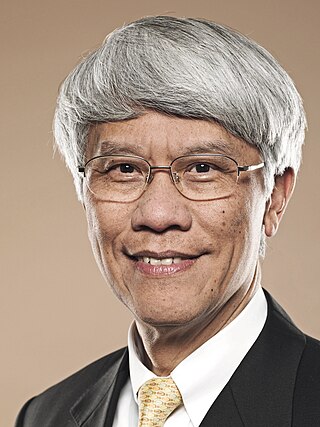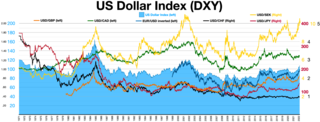Related Research Articles
The renminbi is the official currency of the People's Republic of China. It is the world's 5th most traded currency as of April 2022.

In finance, an exchange rate is the rate at which one currency will be exchanged for another currency. Currencies are most commonly national currencies, but may be sub-national as in the case of Hong Kong or supra-national as in the case of the euro.

The 1997 Asian financial crisis was a period of financial crisis that gripped much of East and Southeast Asia during the late 1990s. The crisis began in Thailand in July 1997 before spreading to several other countries with a ripple effect, raising fears of a worldwide economic meltdown due to financial contagion. However, the recovery in 1998–1999 was rapid, and worries of a meltdown quickly subsided.
The Hong Kong dollar is the official currency of the Hong Kong Special Administrative Region. It is subdivided into 100 cents or 1000 mils. The Hong Kong Monetary Authority is the monetary authority of Hong Kong and the Hong Kong dollar.
In macroeconomics, hard currency, safe-haven currency, or strong currency is any globally traded currency that serves as a reliable and stable store of value. Factors contributing to a currency's hard status might include the stability and reliability of the respective state's legal and bureaucratic institutions, level of corruption, long-term stability of its purchasing power, the associated country's political and fiscal condition and outlook, and the policy posture of the issuing central bank.

The rupiah is the official currency of Indonesia, issued and controlled by Bank Indonesia. Its name is derived from the Sanskrit word for silver, rupyakam (रूप्यकम्). Sometimes, Indonesians also informally use the word perak in referring to rupiah in coins. The rupiah is divided into 100 cents, although high inflation has rendered all coins and banknotes denominated in cents obsolete.

In public finance, a currency board is a monetary authority which is required to maintain a fixed exchange rate with a foreign currency. This policy objective requires the conventional objectives of a central bank to be subordinated to the exchange rate target. In colonial administration, currency boards were popular because of the advantages of printing appropriate denominations for local conditions, and it also benefited the colony with the seigniorage revenue. However, after World War II many independent countries preferred to have central banks and independent currencies.

The Belize dollar is the official currency in Belize. It is normally abbreviated with the dollar sign $, or alternatively BZ$ to distinguish it from other dollar-denominated currencies.
The Hong Kong Monetary Authority (HKMA) is Hong Kong's central banking institution. It is a government authority founded on 1 April 1993 when the Office of the Exchange Fund and the Office of the Commissioner of Banking merged. The organisation reports directly to the Financial Secretary.

The Macanese pataca or Macau pataca is the currency of the Macao Special Administrative Region of the People's Republic of China. It is subdivided into 100 avos, with 10 avos called ho (毫) in Cantonese.

Joseph Yam Chi-kwong, GBM, GBS, CBE, JP is a Hong Kong statistician, economist and civil servant. He was the first Chief Executive of the Hong Kong Monetary Authority, Hong Kong's de facto central bank, holding the position for 16 years. In 2011 Yam was elected to a member of the board of directors of the Swiss Bank UBS AG. In 2014, following UBS AG's restructuring, he was appointed to the board of directors of the UBS Group AG and served in the position till May 2017. He has been a member of the Corporate Culture and Responsibility Committee and the Risk Committee of the UBS Group AG since 2011 and a non-official member of the Executive Council of Hong Kong since 2017.

The foreign exchange market is a global decentralized or over-the-counter (OTC) market for the trading of currencies. This market determines foreign exchange rates for every currency. It includes all aspects of buying, selling and exchanging currencies at current or determined prices. In terms of trading volume, it is by far the largest market in the world, followed by the credit market.

The 1998–2002 Argentine great depression was an economic depression in Argentina, which began in the third quarter of 1998 and lasted until the second quarter of 2002. It followed fifteen years of stagnation and a brief period of free-market reforms. The depression, which began after the Russian and Brazilian financial crises, caused widespread unemployment, riots, the fall of the government, a default on the country's foreign debt, the rise of alternative currencies and the end of the peso's fixed exchange rate to the US dollar. The economy shrank by 28 per cent from 1998 to 2002. In terms of income, over 50 per cent of Argentines lived below the official poverty line and 25 per cent were indigent ; seven out of ten Argentine children were poor at the depth of the crisis in 2002.
A linked exchange rate system is a type of exchange rate regime that pegs the exchange rate of one currency to another. It is the exchange rate system implemented in Hong Kong to stabilise the exchange rate between the Hong Kong dollar (HKD) and the United States dollar (USD). The Macao pataca (MOP) is similarly linked to the Hong Kong dollar.

1980s in Hong Kong marks a period when the territory was known for its wealth and trademark lifestyle. Still a crown colony of the United Kingdom, Hong Kong would be recognised internationally for its politics, entertainment and skyrocketing real estate prices. It would also go on to be the subject of intense negotiations between Britain and China, which would be resolved in the Sino-British Joint Declaration
In economics, a speculative attack is a precipitous selling of untrustworthy assets by previously inactive speculators and the corresponding acquisition of some valuable assets. The first model of a speculative attack was contained in a 1975 discussion paper on the gold market by Stephen Salant and Dale Henderson at the Federal Reserve Board. Paul Krugman, who visited the Board as a graduate student intern, soon adapted their mechanism to explain speculative attacks in the foreign exchange market.

The Russian financial crisis began in Russia on 17 August 1998. It resulted in the Russian government and the Russian Central Bank devaluing the ruble and defaulting on its debt. The crisis had severe impacts on the economies of many neighboring countries.

The Banking Ordinance is a set of laws passed by the Legislative Council of Hong Kong to tighten restrictions for opening up or licensing a bank. Prior to the 1964 re-regulations, the government had no way to control bank's monetary effect on the economy. It also had no way of protecting the people utilizing the institutions. Banking was considered a Laissez-faire network, and was also described as "Free Banking" or "Wildcat Banking" filled with much uncertainty.

The United States dollar was established as the world's foremost reserve currency by the Bretton Woods Agreement of 1944. It claimed this status from sterling after the devastation of two world wars and the massive spending of the United Kingdom's gold reserves. Despite all links to gold being severed in 1971, the dollar continues to be the world's foremost reserve currency. Furthermore, the Bretton Woods Agreement also set up the global post-war monetary system by setting up rules, institutions and procedures for conducting international trade and accessing the global capital markets using the US dollar.
The Euro Currency Index (EUR_I) represents the arithmetic ratio of four major currencies against the Euro: the American dollar, British sterling, the Japanese yen and the Swiss franc. All ratios are expressed in units of currency per Euro. The index was launched in 2004 by the exchange portal Stooq.com. Underlying are 100 points on 4 January 1971. Before the introduction of the European single currency on 1 January 1999 an exchange rate of 1 euro = DM 1.95583 was calculated.
References
- ↑ Jao YC. [1998] (1998). Money and Finance in Hong Kong Retrospect and Prospect. World Scientific Publishing. ISBN 978-981-02-3481-2
- ↑ Jao YC. [2001] (2001). The Asian Financial Crisis and the Ordeal of Hong Kong. Quorum, Greenwood. ISBN 1-56720-447-3